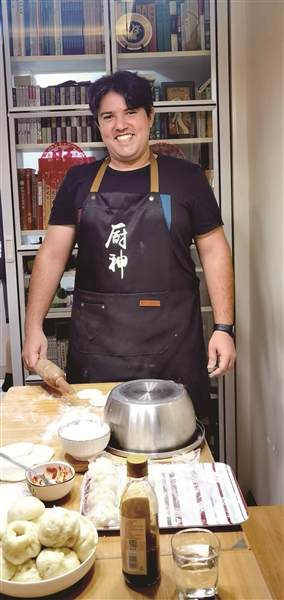
Clod making baozi at Celine’s house Photo provided to Hangzhoufeel
By Daria Fominykh
Do you use ChatGPT or other Large Language Models (LLMs)? Maybe you’ve asked AI to translate Chinese text, improve grammar, or assist with coding, like building a website. But have you ever considered the privacy and safety aspects of using AI?
This is exactly what Clodoaldo Brasilino Leite Neto, a Brazilian professor and PhD researcher in Cyber Security at Zhejiang University, has been working on since arriving in Hangzhou in 2022. Clodoaldo, or Clod, as his friends call him, focuses specifically on the safety of AI-generated code.
Looking at Clod, with his easygoing and extroverted nature, always curious about new people and their cultures, you would never guess that he spends most of his workday alone at home. “In Brazil, people drink coffee three times a day,” Clod says, so naturally, he starts his morning with a cup to freshen up. Then, he dives into work, only taking a break to video call someone special. His day is a balanced mix of work and rest: hitting the gym, taking a nap, working for long stretches, and finishing with another video call at night.
So, what exactly is he working on, and what’s the issue with privacy and safety in AI-generated code? Clod smiles good-naturedly and says it is easiest to explain with a simple example—like a Tic-Tac-Toe game.
“If you ask AI to create a program for a game like Tic-Tac-Toe, it can write the code that sets up the game, follows the rules, and allows players to compete. The game has nine squares, and you put X or O in them—three in a row wins. But could someone exploit shortcomings of that code to make an invalid move or win in a way they shouldn’t?”
AI-generated code can be unsafe because LLMs learn from older codes, which may contain errors. This can lead to programs with security vulnerabilities that hackers could exploit. Clod is working to make AI learn better, more secure coding practices, so that the programs it creates are less likely to be misused, whether in simple games or complex systems.
Clod, speaking with fast-paced enthusiasm and sharp logic, adds, “Most research focuses on whether the generated code works as intended—does it play the game correctly and follow the rules? My interest is in a different angle: how could this code be misused to cause harm?”
According to him, few researchers are working on this issue, but China is one of the leading countries in computer security research today.
Despite some challenges of living abroad, Clod remains cheerful and energetic. He connects with local people in China by sharing food, music, and participating in cultural events, like the Emerald English Club (EEC), where he introduced Brazilian culture.
Celine, who is Chinese and the president of EEC, has become good friends with Clod. “Clod’s warm, Brazilian energy shines through his love for music, dancing, and his constant smile. He has taught me some basic Portuguese and shared his passion for Brazilian culture,” she says.
Celine describes him as an excellent cook who often hosts barbecues at his home. She adds that he’s eager to learn how to make Chinese dishes like baozi (steamed stuffed buns). She even invited Clod and some other international friends to learn how to make baozi from her mother. He always brings Brazilian instruments, spreading joy by teaching others to play them. “His curiosity about Chinese culture and his positive, lively spirit make him a truly special person to be around,” Celine concludes.
Clod says he’s enjoying his life in Hangzhou. He loves riding his cheerful mint-green bicycle, traveling up to 20-30 kilometers away from home to explore lesser-known, beautiful places. He also enjoys walking through the streets, observing the daily life of locals and what makes them happy.
“We, as foreigners, are always curious about local life and culture in China. It’s fascinating to learn about the music, the instruments people play, and to see traditional Chinese opera performed in the streets. It’s been an enriching experience for me that I would never get in Brazil,” he says.
For most of the time, Clod stays upbeat, but one of the biggest challenges of doing research abroad is being separated from his wife, Claudia. They’ve been together for 14 years, and though they’re on opposite sides of the world, they start and end each day with a video call.
Through Clod’s journey, Claudia has been there--supporting his curiosity to come to China and following him to Hangzhou during the pandemic to help him settle in.
With continued effort and the support of his loved ones, Clod is well on his way to making progress in his research. Maybe one day when we introduce Hangzhou to a friend, we’ll mention it as “the city where a Brazilian scientist contributed to advancements in cybersecurity.” Who knows?
